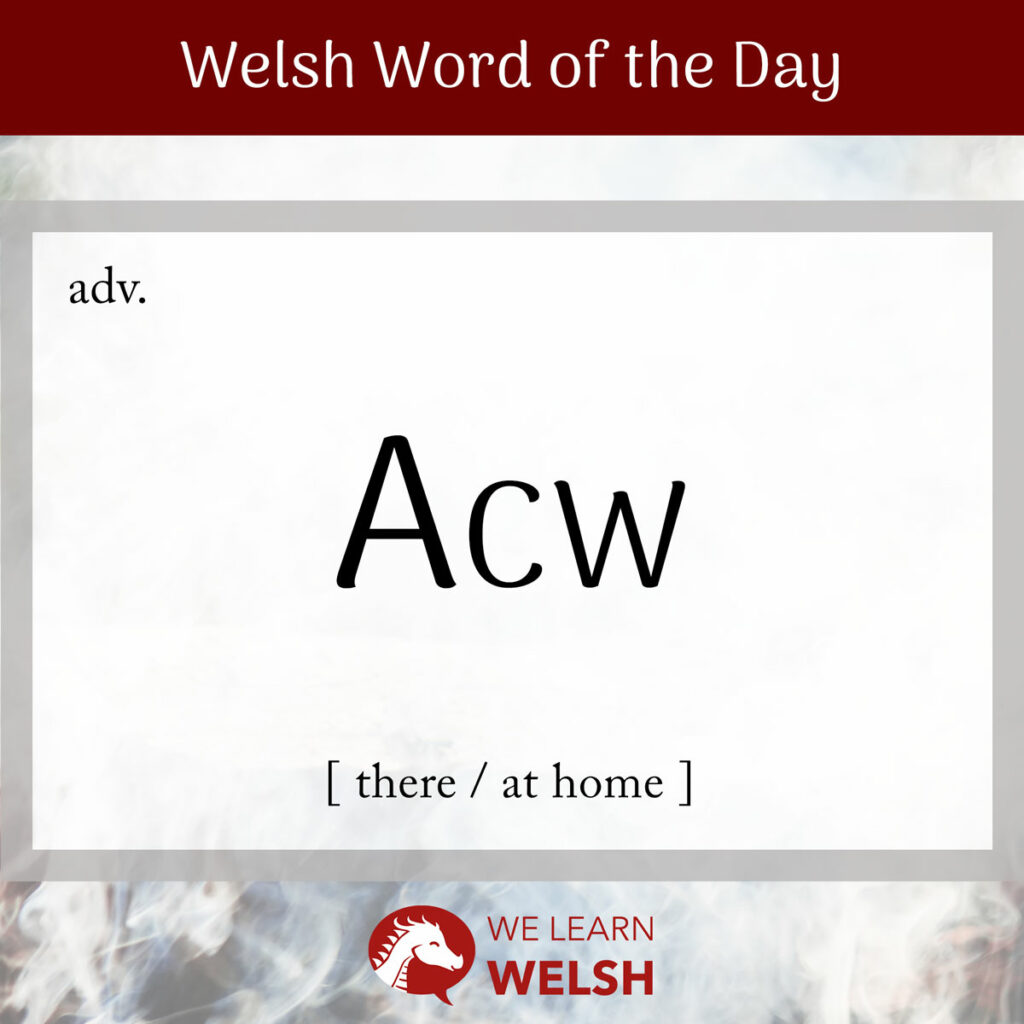If you’ve spent much time chatting to Welsh speakers, you’ll probably at some point have heard the simple word acw used to punctuate phrases – but depending on where the person is from, the meaning can actually be slightly different.
Acw is an adverb that, in its most basic form, is a way of saying there. However, in North Wales in particular it’s often used to mean at home.
acw
there / at home
This word has a curious etymology because it’s the exact opposite of what many people assume. Acw is actually a shortening of the older form rhacw / racw, itself derived from rhag (which has several meanings, but here means ‘before’ or ‘forward’).
If you didn’t know this, though, and simply came across the word rhacw, you’d probably guess it was formed by combining rhai or yr with acw. In fact, Welsh dictionaries indicate that it was acw that originally developed from rhacw – not the other way around.
This is a more common phenomenon than you might think – take the word hamburger, which actually comes from the city Hamburg. That hasn’t stopped English speakers from using the suffix burger to refer to any kind of similar food, separating the word in a way different to how it was originally constructed. This is called a camraniad (rebracketing, in Welsh literally mis-sharing).
Incidentally, a burger in Welsh is usually just called a byrgyr.
So the first meaning of acw is there. This is used all over the country, but is perhaps slightly more common outside of the North, as there it’s more recognisably used with the second meaning.
Wyt ti’n adnabod y merched acw?
Do you know those girls over there?
Acw as there might seem confusing if you’re very used to the word yna, also meaning there. And most of the time yna is indeed the right word to use. The seeming overlap comes from a simple linguistic difference between Welsh and English.
In English, we have a straightforward contrast between here and there. In Welsh there are actually three gradations – yma, yna, and acw – which are each successively further away from the speaker. There is even yno, which is somewhere so far away that it can’t be seen or pointed to.
This seems less confusing when you realise it’s the case in multiple languages! Take Spanish, which has aqui, alli, and alla, broadly corresponding to yma, yna, and acw. Even English used to have the same thing: here, there, and yonder. Today yonder is not in common usage in the vast majority of English dialects, but it’s a pretty good translation for acw.
Though yna and acw are not directly synonymous, some speakers may use them interchangeably. Others may say draw acw (roughly over there), rather than acw, or use shortenings like ‘co or ‘cw.
Another form is dacw. This is originally a shortening of the phrase wele di acw (see over there). A good way to understand it is that dacw is to acw as dyna (there is) is to yna (there) and dyma (here is) is to yma (here). So dacw can be roughly translated as yonder is or over there is.
You can see its usage in the proverb:
Hawdd yw dwedyd “dacw’r Wyddfa”; nid eir drosti ond yn ara’.
It’s easy to say “there’s Snowdon”, but you’ll only get over it slowly.
Dacw also causes a soft mutation to words that follow it.
Though yna (there) is the intermediate word which comes between yma and acw, these two are actually often combined. Yma ac acw means here and there and is a common phrase in everyday speech. You can also say nac yma nac acw (neither here nor there).
It may also be combined with hyn, hwn, or hon, producing meanings like that thing over yonder. This can be shortened in various ways, like ‘nacw in the North and hwnco / honco / hynco in the South.
The second meaning is at home, at ours, or at my place. For example, to say Mari is at home, you can simply say mae Mari acw. Or, sut mae’r teulu acw? (how are the family at home?) is one way of asking how someone’s family is. It functions in this case as a very simple adverb, and can just be inserted at the end of sentences and phrases.
So the word can give a bit of a cartrefol (homely) feel, and is sometimes used as a name for tai gwyliau (holiday houses).
In this sense, acw is generally exclusive to the North. Non-Northern Welsh speakers will probably understand what you mean if you employ acw in this sense but are unlikely to use it themselves.
‘Sdim angen i ni brynu hufen iâ; mae gynnon ni lawer acw.
We don’t need to buy ice cream; we have loads at home.
The words cartref and adref mean home, too, and work as adverbs to also mean at home. Historically adref was used more to mean towards home whereas cartref meant at home, but today in colloquial language they are often interchangeable. Cartref is more common in the South and adref in the North, and both words are often pronounced without the final f.
Do you use the word acw when speaking in Welsh? Which usage do you gravitate towards – or maybe it’s both? Let us know!


